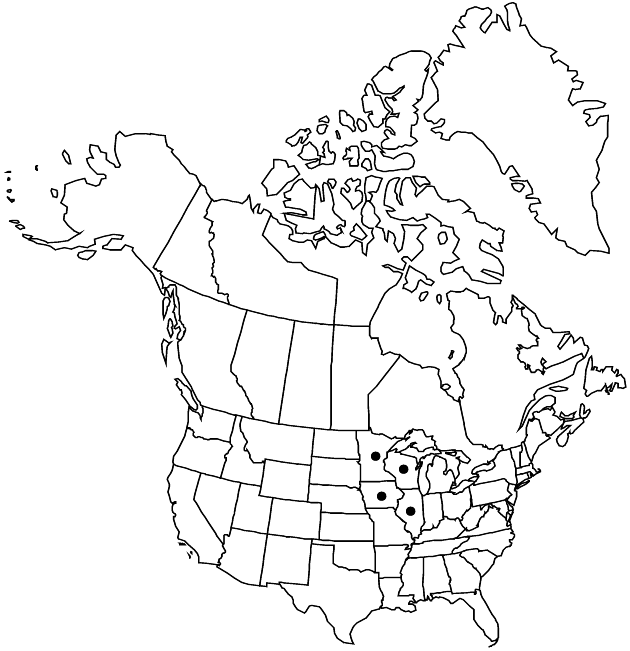Difference between revisions of "Solidago sciaphila"
Contr. U.S. Natl. Herb. 13: 371. 1911.
FNA>Volume Importer |
imported>Volume Importer |
||
| (6 intermediate revisions by 2 users not shown) | |||
| Line 8: | Line 8: | ||
}} | }} | ||
|common_names=Shadowy goldenrod | |common_names=Shadowy goldenrod | ||
| + | |special_status={{Treatment/ID/Special_status | ||
| + | |code=E | ||
| + | |label=Endemic | ||
| + | }} | ||
|basionyms= | |basionyms= | ||
|synonyms= | |synonyms= | ||
| Line 24: | Line 28: | ||
|elevation=200–400 m | |elevation=200–400 m | ||
|distribution=Ill.;Iowa;Minn.;Wis. | |distribution=Ill.;Iowa;Minn.;Wis. | ||
| − | |discussion=<p>Solidago sciaphila is similar to S. speciosa, but the proximal leaves are obviously serrate.</p> | + | |discussion=<p><i>Solidago sciaphila</i> is similar to <i>S. speciosa</i>, but the proximal leaves are obviously serrate.</p> |
|tables= | |tables= | ||
|references= | |references= | ||
| Line 33: | Line 37: | ||
-->{{#Taxon: | -->{{#Taxon: | ||
name=Solidago sciaphila | name=Solidago sciaphila | ||
| − | |||
|authority=E. S. Steele | |authority=E. S. Steele | ||
|rank=species | |rank=species | ||
| Line 47: | Line 50: | ||
|publication title=Contr. U.S. Natl. Herb. | |publication title=Contr. U.S. Natl. Herb. | ||
|publication year=1911 | |publication year=1911 | ||
| − | |special status= | + | |special status=Endemic |
| − | |source xml=https:// | + | |source xml=https://bitbucket.org/aafc-mbb/fna-data-curation/src/2e0870ddd59836b60bcf96646a41e87ea5a5943a/coarse_grained_fna_xml/V19-20-21/V20_250.xml |
|tribe=Asteraceae tribe Astereae | |tribe=Asteraceae tribe Astereae | ||
|genus=Solidago | |genus=Solidago | ||
Latest revision as of 20:01, 5 November 2020
Plants 20–70(–100) cm; caudices thick, woody. Stems single (sometimes purplish brown, ridged), glabrous, strigose distally in arrays. Leaves: basal and proximal tapering to winged petioles, blades (basal) spatulate, 20–40 mm, (proximal) obovate to oblanceolate or elliptic, 60–150(–200) × 30–55 mm, margins serrate (teeth shallow to 5 mm), ciliate, acute to obtuse, acuminate or mucronate, faces abaxially glabrate to sparsely strigose, especially on nerves, adaxially glabrous; mid and distal cauline sessile, lancelate or oblanceolate to elliptic, 30–100 × 20–40 mm, reduced distally, margins serrate to entire distally. Heads 20–180+ (1–6 per branch), in leafy wand-paniculiform arrays (2–)10–20(–40) cm, lateral branches usually not exceeding subtending leaf bracts. Peduncles 1–3 mm, strigose; bracts and bracteoles lanceolate to ovate, grading into phyllaries. Involucres campanulate, ca. 5 mm. Phyllaries in 3–4 series, appressed, strongly unequal, outer grading from ovate bracteoles, mid oblong, rounded, inner linear-oblong, acute, glabrous. Ray florets ca. 6–10; laminae 1.5–2.5 × 0.5 mm. Disc florets ca. 10; corollas 3.5–5 mm, lobes 1–1.5 mm. Cypselae (narrowly obconic) 2.5–3 mm, moderately strigillose; pappi ca. 4 mm (sometimes weakly clavate). 2n = 36.
Phenology: Flowering Aug–Sep.
Habitat: Sandstone and limestone bluffs and ledges along Mississippi River
Elevation: 200–400 m
Distribution

Ill., Iowa, Minn., Wis.
Discussion
Solidago sciaphila is similar to S. speciosa, but the proximal leaves are obviously serrate.
Selected References
None.